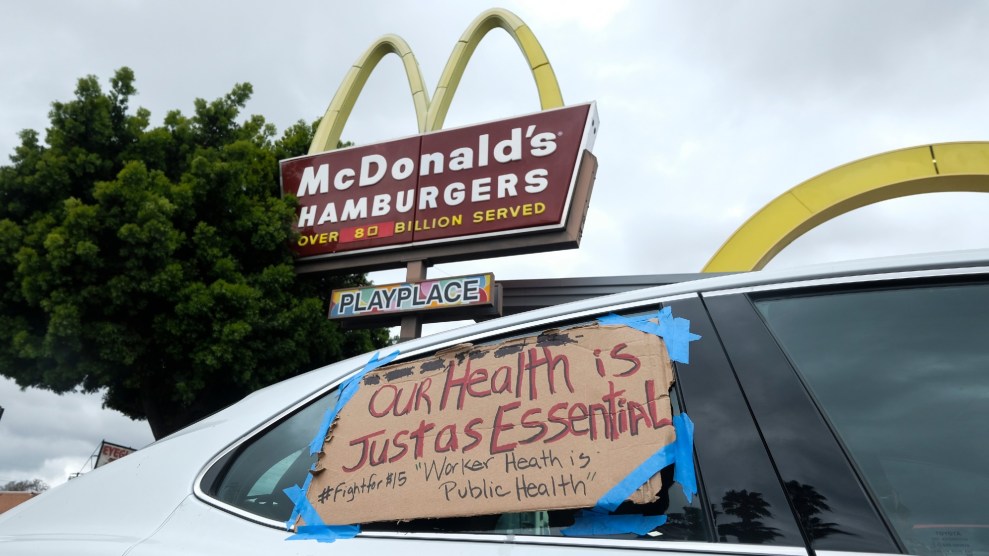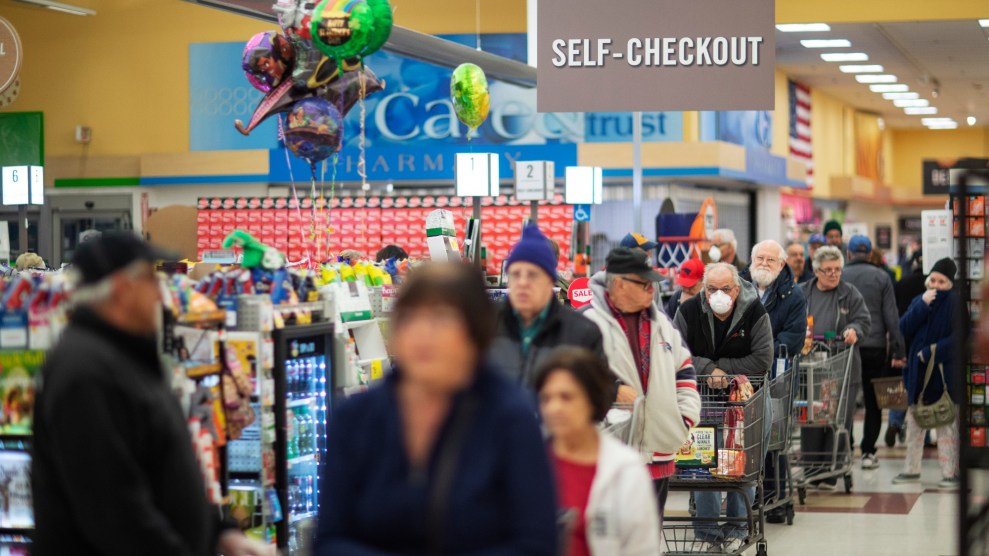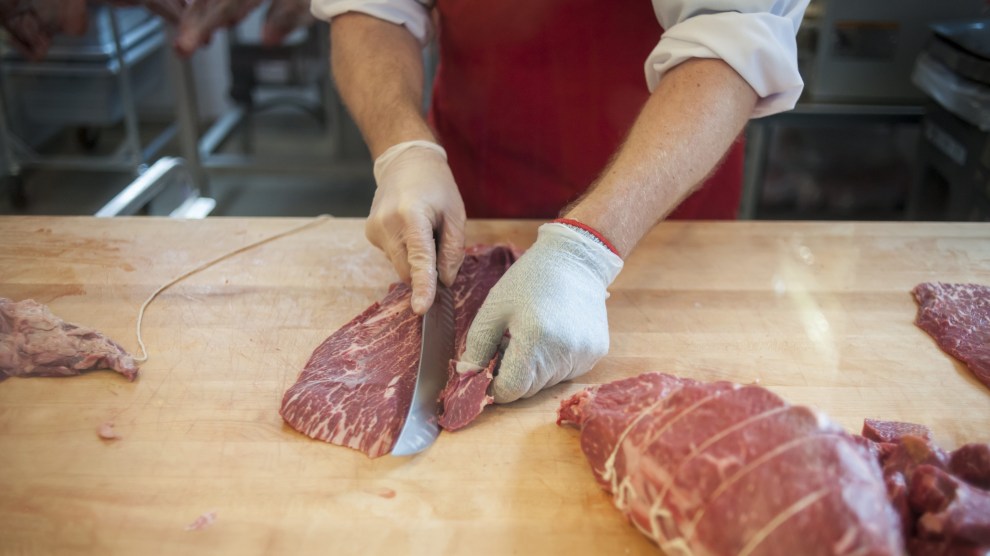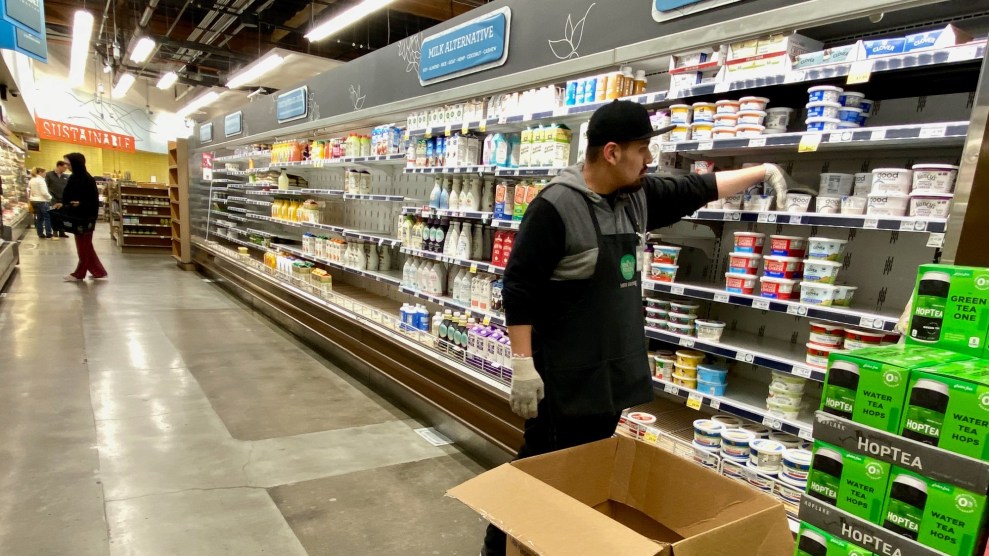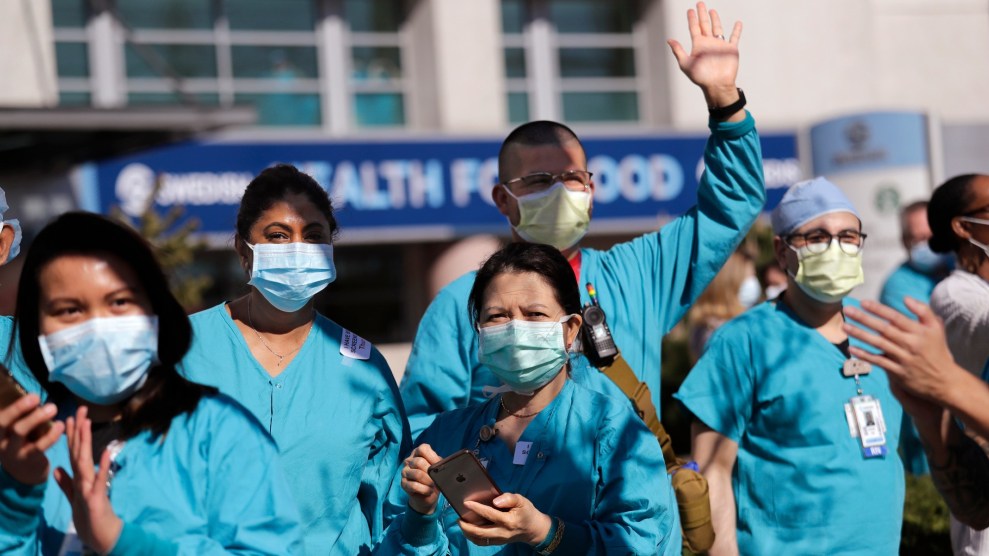
Seattle health care workers look on as first responders gathered outside the hospital in support of them in their work against the coronavirus outbreak.Elaine Thompson/AP
Social distancing at work isn’t an option for Joyce Barnes, a home care provider in an independent-living senior facility in Henrico County, Virginia. “It’s hard to stand 6 feet apart when you’ve got to help this person bathe and put hands on them,” Barnes says.
Barnes, 60, goes to the grocery store every other day for the patients she’s paid to care for, as well as others in the facility who have asked for help. She’s terrified of bringing the virus back to the senior home. “If I get sick today or tomorrow, they get nobody,” Barnes says. But even though she’s tasked with shopping for the seniors in her care, the company she works for hasn’t provided her with gloves or a mask.
So now, Barnes, along with other members of her SEIU union chapter, has joined a push for a new Essential Workers Bill of Rights. The bill was proposed by Sen. Elizabeth Warren (D-Mass.) and Rep. Ro Khanna (D-Calif.) on Monday. The legislators also propose making the Bill of Rights part of the next coronavirus relief package.
Frontline workers – health care, transit, farm, grocery, domestic & delivery workers – are risking their lives to keep America running. We can’t rely on big business to protect them. So @RepRoKhanna & I are proposing an Essential Workers Bill of Rights to #ProtectEssentialWorkers pic.twitter.com/XlO1TKguVI
— Elizabeth Warren (@SenWarren) April 13, 2020
“Congress needs to understand you cannot solve the COVID-19 crisis without addressing essential worker issues,” says David Madland, a senior fellow at the Center for American Progress. “Workers need and deserve protection so that they aren’t at risk, and when these essential workers are at risk, public health in the entire country is at risk.”
The Essential Workers Bill of Rights would provide protections for front-line workers like nurses, grocery clerks, janitors, delivery drivers, farmworkers, and bus drivers. The bill would require employers to provide personal protective equipment to essential workers, as well as notify employees and evacuate worksites in case of coronavirus exposure; provide “robust premium pay,” health care, and child care support to these workers; and guarantee paid sick and family leave. It would protect workers’ right to join a union, crack down on misclassification of independent contractors, and protect whistleblowers. The proposal also includes provisions to put essential workers on key task forces and prevent tax dollars from going to CEOs or shareholders.
“Essential workers are the backbone of our nation’s response to coronavirus,” Warren said in a press statement. “Nearly 60 million Americans are still working to keep our internet running, to deliver our groceries, to make sure we have electricity, and to care for the sick,” Khanna said in the same statement. “This crisis needs to open our eyes to the value of workers who are often invisible, and we need to give them the pay and benefits they deserve.”
The bill has garnered support from progressive organizations including MoveOn, SEIU, the American Federation of Teachers, the National Domestic Workers Alliance, Color of Change, and the Sunrise Movement. A survey released on April 16 from Data for Progress shows that 75 percent of those polled support an Essential Workers Bill of Rights, including 81 percent of Democrats and 73 percent of Republicans.
Maurice Mitchell, national director of the Working Families Party, which supports the bill, says it represents “the very, very least a country can do for the people who are ensuring that we survive this crisis.” Mitchell, who co-parents a toddler with an emergency room doctor, knows firsthand the value of child care right now. A growing number of states, including Minnesota, Michigan, and Vermont, are providing free child care to essential workers like first responders and grocery workers. But Mitchell says a federal solution is needed.
“There are school-age children who must stay home. There are essential workers who must work. Both of these things must happen,” Mitchell says. “How can we not guarantee child care in these instances?”
The bill would also provide paid sick days for essential workers. Though the Families First Coronavirus Response Act was supposed to provide emergency paid sick time for people to recover from the coronavirus, the law provided exemptions for businesses with fewer than 50 and more than 500 workers. That means 85 percent of workers who work essential jobs in grocery stores, pharmacies, and general merchandise aren’t covered by the law, according to a new brief from the University of California, Berkeley’s Shift Project.
For Barnes, the bill would provide a much-needed pay boost as well as health care, paid sick days, and a right to personal protective equipment. She makes $9.44 an hour caring for her patients, too much to qualify for Medicaid but not enough to afford health insurance.
Front-line workers are disproportionately women and people of color, data from the Center for Economic and Policy Research show. The group reports that nearly 90 percent of front-line home health care workers are women, and more than half are people of color. The New York Times reported last month that home health aides who work with elderly people are particularly vulnerable to the coronavirus.
David Madland acknowledges that with polarization on Capitol Hill, the chances of passing the entire package are slim. For instance, Sen. John Barrasso (R-Wy.) told Fox Business that the plan to include the bill in the next stimulus package represented Warren “trying to hold hostage at gunpoint American workers’ paychecks.”
But Madland says parts of the bill could make it through. “There’s a chance for sort of scrambled politics here,” he says. “In traditional times, an Essential Workers Bill of Rights would have little chance of passage because sadly too many Republicans oppose basic rights for workers. But these are different times, and this is a crisis, so it has some chance.”
Momentum is building to protect front-line workers both among workers themselves, who are increasingly going on strike to demand better protections, and on Capitol Hill. Madland also noted that some employers, like Kroger and Albertsons, have come out in support of making grocery workers first responders.
“The first responder concept, to me, is a step in the right direction, but it’s not enough,” he says. “Essential workers need more than just masks and gloves—they need a broad set of protections to enable them to safely go to work.”
The Working Families Party and the other groups backing the Essential Workers Bill of Rights plan to mobilize a grassroots campaign in coming weeks to pressure Congressional leadership to support the measures in the next coronavirus relief package. Protecting essential workers should go beyond partisanship for members of Congress, Mitchell says. “This is a time for them to act with just an iota of the courage that the front-line workers and essential workers have been showing up with every single day.”
Barnes loves working one-on-one with her patients, and has been caring for some seniors who aren’t technically her patients at their families’ request. But she’s terrified of making them sick, and of catching the coronavirus herself—and with good reason. In one Richmond long-term care facility, just a few miles away from the independent living senior home where Barnes and her patients live, 45 people have so far died from the coronavirus.
“I don’t want to be on the front lines and not treated like it,” Barnes says. “They forgot about us.”

